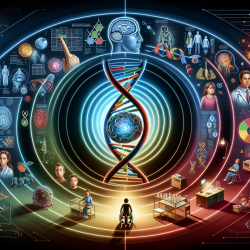The recent research article "Expansion of the clinical phenotype associated with mutations in activity-dependent neuroprotective protein" provides valuable insights into the role of ADNP mutations in neurodevelopmental disorders. This blog aims to help practitioners enhance their skills by implementing the outcomes of this research or encouraging further exploration.
The Role of ADNP in Neurodevelopment
Activity-dependent neuroprotective protein (ADNP) is a critical transcription factor involved in brain development. It is highly expressed during prenatal stages, and its mutations have been linked to autism spectrum disorder (ASD) and intellectual disabilities (ID). The study highlights that these mutations can also affect the visual system, suggesting a broader clinical phenotype than previously understood.
Key Findings and Clinical Implications
- ADNP Mutations and ASD: The study identified that ADNP mutations are present in approximately 0.17% of ASD cases. Practitioners should consider genetic screening for ADNP mutations in patients with ASD, especially those with accompanying intellectual disabilities or dysmorphic features.
- Visual System Abnormalities: The research expands the phenotype to include visual impairments such as eye movement abnormalities and cortical visual impairment. Clinicians should screen for these symptoms in patients with known ADNP mutations.
- Mood Disorders: The study reports mood disorders as a secondary feature of ADNP mutations. This finding suggests that practitioners should monitor mood-related symptoms in affected individuals.
Implementing Research Outcomes
Practitioners can integrate these findings into their practice by:
- Enhanced Screening: Incorporate genetic testing for ADNP mutations in diagnostic protocols for patients with ASD and related disorders.
- Comprehensive Assessments: Conduct thorough evaluations of visual and mood symptoms in patients with identified ADNP mutations.
- Interdisciplinary Collaboration: Work closely with geneticists, neurologists, and psychologists to provide holistic care for patients with complex phenotypes.
Encouraging Further Research
This study opens avenues for further research into the mechanisms by which ADNP mutations affect neurodevelopment. Practitioners are encouraged to contribute to ongoing research efforts by sharing clinical observations and collaborating on studies that explore novel therapeutic interventions.
To read the original research paper, please follow this link: Expansion of the clinical phenotype associated with mutations in activity-dependent neuroprotective protein.










